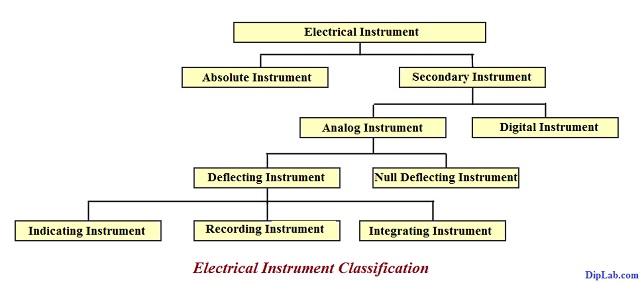
The first article is based on Electrical Measurement & Instrumentation (EMI). Here, I am describing the major concepts of electrical measuring instruments in detail.
Before starting any electrical or electronics device installations or studying electrical practicals, we should know about the measurements and its measuring instruments.
This basic knowledge will help you throughout your electrical and electronics engineering.
Read it completely.
Table of Contents
What is Electrical Measurement & Instrument?
Basically, measurement is an essential act to determine the electrical measuring unit.
It performs by comparing an unknown quantity’s unit and the standard unit of an electronic device.
Definition:
A measuring devices which use to measure or compare unknown quantity with standard quantity is called as ‘Measuring Instrument’
In simple words, sometimes, the measuring instrument called as ‘Meter’.
Ammeter, Voltmeter, Ohmmeter, and wattmeter are examples of electrical measuring instruments. These instruments calculate or measure the value of electrical quantities (current, voltage, resistance, electric power.
Practically, electrical measurement is a comparison between actual measurement value and standard value. This value is also called as ‘True value‘.
After comparing, there can be some deviation called ‘Error‘. The error is the deviation of the measurement value to the standard value. It is denoted by ‘δ‘.
Mathematically represent as,
Error, (δ)= [(Measured value)-(Standard value)]= [(Am)-(At)]
Note: When (Am)>(At), a Positive Error occurs. And when (Am)<(At), a Negative Error occurs.
Classification of Electrical Measuring Instrument
The classification of an electrical measuring instrument is based on the nature of the operation, function, purpose, uses, and many other terms.
Generally, it is classified into two categories.
- Direct Measuring Instrument
- Comparison Measuring Instrument
A direct measuring instrument measures the electrical unit by reading and deflection. Ammeter, voltmeter, and wattmeter are types of direct measuring instruments.
It is mostly used in engineering practical study, especially in the electrical and electronics streams. It is simple and inexpensive as compared to the comparison instrument.
It is also classified into two different parts like,
- Absolute Instrument
- Secondary Instrument

For further classification details, I have explained each type of electrical measuring instrument in another article.
Multimeters are a popular type of electrical measuring instrument. Like its name, it works like an ammeter, voltmeter, and ohmmeter to measure current, voltage, and resistance, respectively.
The multimeter is available in two different forms, like-
- Analog type Multimeter
- Digital type Multimeter
In this advanced technology, both types of meters are needed as per requirement.
A signal multimeter performs all standard analog and digital meters measurement units or functions for AC and DC.
What are the Advantages of Digital Multimeter over the Analog Multimeter?
The analog type of multimeter shows the continuous signal. It detects and displays the electrical reading by using the moving pointer.
Whereas, the digital type of multimeter shows the discrete signal. And it measures and displays the numeric measuring unit or value.
So, a digital multimeter (DMM) gives a more accurate, fast response and readable digital output over an analog multimeter.
Digital meter is also called as ‘Smart Meters‘ or ‘Advance Meters’.
With this single smart meter, you can measure multiple units. Instead of buying separate meters to measure current, voltage, resistance, and so on, you buy digital a multimeter.
Read more– Advantages and disadvantages of digital multimeter over analog multimeter
Necessity or Uses of Electrical Measuring Instruments
The main functions of the measurement system are indicating, recording, detecting, controlling and testing the electrical units.
Apart from that, here are some important used.
- It helps to control and monitor the operation in an electrical system.
- You can find out the error in the measuring unit with the help of standard values.
- In generating power stations, instruments are used for data recording, measuring the value, fault detecting, and many more purpose.
- It helps to detect and protect from hazardous conditions.
- Measuring instrument uses for the analysis of experimental data in an electrical system.
- It is essential for displaying accurate numerical values. A digital multimeter is one of them.
- Mostly, it utilizes in testing in the lab, industrial environment, science, engineering study, building an electrical and electronics project, etc.
Thus, here I have covered electrical measuring instruments with their classification and uses.
Read more related Articles:
- Types of electrical measuring instruments
- Analog signal vs Digital signal
- Analog multimeter vs Digital multimeter
- Voltmeter vs Potentiometer
- Ammeter vs Voltmeter
- Types of ammeter & voltmeter
- Digital pulse oximeter
- Different types of sensors
Ready for Test:
If you are ready for an online test, click on Electrical Measurement and Instrumentation Quiz.
If you have any queries or points to discuss, write in the comment.
Thanks for Reading!

Great,simple and direct content.
Thank you!
Please, inke bare me detail se batayo.
Sure, Prince!
Soon, I will explain each measuring instruments in details.
Good job
Thanks, Mubin.
Electrical instruments or tools are used to find faults overtime of the electrical circuit. I find that very interesting and it makes sense cause the electricity will run through the circuit till it gets to the fault and just cut out. We can measure that and even find faults in that way. Thanks for these detailed notes.
You’re welcome, Oliver! And great to hear from you.
Good information about electrical instruments I want to learn more through you about electrical installations this is the cause I learn at college Called SCRIPTURE UNION OF TANZANIA (VTC) thanks dear
You’re most welcome, Donald!
If you know any details about the measuring instruments, you can share in the comment section. I will add this.
Hi,
Please, can you tell me about the types of electrical testing instruments about 5 to 10 with the aid of the diagram and the uses, range and disturbances?
Thank you for the information.
You are most welcome, Deep.
Thank you for the information, really helpful
Thanks Isaiah, you too for sharing a few words.
Very informative post. Thanks for sharing a post.
You’re most welcome 🙂
Wrong!
Secondary instruments are further classified as Analog instruments and Digital Instruments.
Absolute instruments are seldom used except in standard institutions and laboratories
Thank You for the corrections. Did it.
Wow, thank you for that well elaborated information.
Thanks, Sharon.